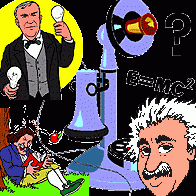
This past week’s issue of Time magazine is headlined: The Invention Issue, and the lead feature article is called Reinventing the Inventor. In large font, Lev Grossman writes:
In the age of Steve Jobs, it’s all about perfecting the final product. Nobody remembers the guy who had the idea in the first place.
It’s a curious statement to make, I thought, so I read on. Grossman sees this as a new and disturbing phenomenon and lays the blame for it squarely at the feet of the late Steve Jobs. He dismisses Jobs as a mere “optimizer.” Grossman imagines a time when we revered our inventors and asks, “When did scientific innovation stop being sexy?”
I couldn’t help wondering: Are we still that confused about the nature of innovation? (Apparently.)
To begin with, let’s recall that many famous “inventors” were not the first to invent all sorts of things that have been credited to them. Despite all the legends, Thomas Edison was not the first to invent the light bulb or sound recording or motion pictures. Henry Ford was not the first to invent the automobile. Americans are so fascinated with the notion of the genius inventor, we tend to create them where they don’t exist (or at least our media does).
The true inventors who have been accurately credited, folks like the Wright brothers for the airplane and Alexander Graham Bell for the telephone, are remembered and romanticized partly because such cases are so rare. They were breakthroughs whose value was so obvious and so immediate that they quickly attracted attention at the time. As many inventors will attest, that’s not typical. Most people couldn’t name the inventors of the helicopter, the jet engine, the computer, the ball point pen, the saxophone, the zipper and countless other technologies we use every day.
We have long honored those who successfully bring an idea to maturity rather than the originators, and I don’t think we’re misguided when we do that. Don’t misunderstand me. I’m a great admirer of inventors and I love following the latest scientific breakthroughs. They are central to innovation and technological progress. But anyone who’s spent much time involved in real world innovation knows that coming up with an idea—even a prototype—while important and commendable, is often the easy part of the process. No better sources than Ford and Edison emphasized the crucial role of determination and hard work in bringing those inventions successfully into our lives.
It’s hard to overstate the importance that “optimizers” like Jobs have played. If the computer mouse had stayed a primitive prototype at Xerox PARC, would anyone care? Jobs saw its potential and made it commonplace. No one seems to have much interest in knowing who invented the tablet computer, but we all know where the iPad came from. We know because it provides tangible value not just a technological advance.
Inventions fill patent files by the thousands every year, and some are truly breakthrough ideas worthy of our awe. But innovation is about creating real value and relatively few of those inventions will ever make that cut.
We should honor our inventors and perhaps we don’t do that enough, but having an original idea is just one early step toward successful innovation. We rightly and very pragmatically withhold our thanks and praise until we can see a clear benefit. So we prize innovation more than invention. It makes perfect sense to do that and it’s nothing new. It would be misguided and counterproductive to do otherwise. Giving full credit for an innovation to the inventor implies that invention is all that’s required. No one knows better than an inventor what a huge myth that usually turns out to be.
The next time you have a great idea or invention, worry less about who may get credit than about what sort of collaborators you can attract to help you turn your idea into a genuine innovation.
Get the new Special Report, Innovation Essentials: The Four Greatest Ways We stop Ourselves…In Business and in Life. Download a free copy at: http://innovatormindset.com/specialreport.htm

Leave A Comment